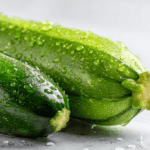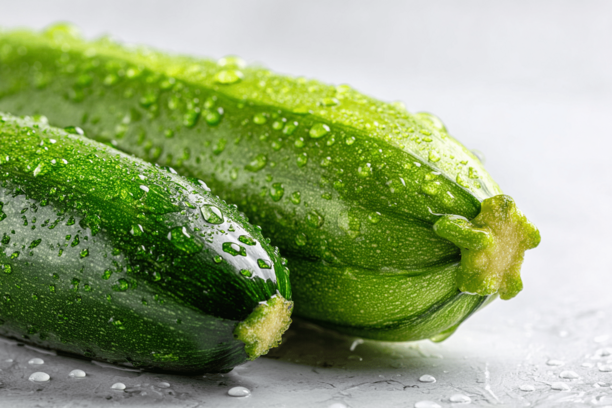Zucchini vs Cucumber: Unraveling the Green Veggies in Your Kitchen
Estimated reading time: 12 minutes
Key Takeaways
- Zucchini and cucumber may look similar, but zucchini is a summer squash with a slightly sweet flavor, while cucumber is a refreshing fruit often used in salads.
- Nutritionally, zucchini offers more vitamins and fiber, making it a versatile ingredient for cooking, whereas cucumber is low in calories and hydrating for raw consumption.
- Understanding their differences can enhance your meal prep, from stir-fries with zucchini to cool cucumber salads, and help avoid common kitchen mix-ups.
- Both veggies can be stored similarly, but zucchini requires quicker use to maintain freshness, impacting recipe outcomes.
- Explore recipes for each to maximize their unique benefits in your daily diet.
Table of Contents
Introduction
Have you ever reached for what you thought was a cucumber, only to discover it was a zucchini, or vice versa? As a home cook and food enthusiast, I’ve had my fair share of kitchen surprises that turned into delightful discoveries. Zucchini vs cucumber is a debate that often pops up in my kitchen experiments, especially when I’m planning fresh summer meals. Today, we’re diving deep into this green veggie showdown, exploring their origins, uses, and how they can elevate your everyday recipes. Zucchini and cucumber might share a similar appearance, but their differences in texture, taste, and nutrition make them unique stars in the culinary world.
Growing up in a family that treasured garden-fresh produce, I remember my grandmother’s garden overflowing with these greens. She’d often share stories of how zucchini became a staple in hearty stews, while cucumber cooled down our hot summer days. This article isn’t just a simple comparison; it’s a journey through my experiences, backed by expert insights from chefs like Chef Mia, who emphasizes the importance of knowing your ingredients for better meal outcomes. Let’s unpack the nuances of zucchini vs cucumber to help you make informed choices in your kitchen.
By the end of this guide, you’ll understand why selecting the right one can transform a mundane salad into a masterpiece. Whether you’re a beginner or a seasoned cook, this exploration will build your confidence in handling these versatile veggies.
What is Zucchini?
Zucchini, often called a summer squash, is a versatile vegetable that hails from the Americas but has become a global favorite. Its mild, slightly sweet flavor and tender texture make it perfect for a wide range of dishes. In my early cooking days, I experimented with zucchini in everything from grilled sides to baked goods, and it never disappointed. Zucchini vs cucumber starts here, as zucchini brings a heartier bite that absorbs flavors beautifully.
As a member of the gourd family, zucchini is harvested when young for the best taste. Chefs like Chef Mia often highlight its adaptability, noting that it’s low in calories yet packed with nutrients. Picture a fresh zucchini from the farmer’s market; it’s not just food, it’s a canvas for creativity.
Origins and Varieties
Originating from Central America, zucchini was domesticated thousands of years ago. There are numerous varieties, from the classic green to yellow and even striped ones. In my garden, I grow the straight-neck variety, which adds a personal touch to my zucchini vs cucumber discussions.
Experts point out that different varieties affect cooking times and flavors, making selection key for recipes.
What is Cucumber?
On the other side of the zucchini vs cucumber spectrum is the cucumber, a crisp and refreshing fruit technically, though we treat it as a vegetable. Native to India, cucumbers have been cooling palates for centuries. I’ve always loved how a simple cucumber slice can refresh a hot day, reminiscing about picnics where it was the star of salads.
Cucumbers are mostly water, which makes them incredibly hydrating. Chef Mia often shares that their subtle taste is ideal for light dishes, contrasting the more robust zucchini. This difference is what makes the zucchini vs cucumber comparison so fascinating for everyday cooking.
Uses and Benefits
From pickling to smoothies, cucumbers are endlessly versatile. Their high water content aids in hydration, a point nutritionists frequently emphasize.
In my recipes, cucumbers add crunch without overwhelming other flavors, a trick I’ve learned over years of experimentation.
Key Differences
When pitting zucchini vs cucumber, the differences become clear in texture, taste, and culinary roles. Zucchini has a firmer flesh that softens when cooked, while cucumber remains crisp even raw. I once confused the two in a stir-fry, leading to a valuable lesson on their distinct properties.
Texture and Taste
Zucchini boasts a subtle sweetness and earthiness, ideal for savory dishes. Cucumber, however, offers a clean, watery crunch that’s perfect for fresh eats. Studies show zucchini’s density makes it better for baking, whereas cucumber shines in raw preparations.
Culinary Roles
In recipes, zucchini often takes center stage in mains, while cucumber supports as a side. For instance, zucchini stir-fry recipes highlight its versatility.
- Start with fresh produce for best results.
- Avoid overcooking zucchini to retain nutrients.
- Use cucumber in chilled dishes for maximum refreshment.
Nutritional Comparison
Diving into zucchini vs cucumber nutrition, both are healthy, but zucchini edges out with higher vitamin content. A medium zucchini provides about 35 calories, 2 grams of fiber, and essential vitamins like C and K. Cucumber, at around 16 calories per cup, is a hydration hero with minimal calories.
According to dietary experts, zucchini’s protein and antioxidants make it a better choice for balanced meals. In contrast, cucumber’s low sugar content suits weight management. Data from health studies indicate that incorporating both can enhance a diverse diet.
| Nutrient | Zucchini (per 100g) | Cucumber (per 100g) |
|---|---|---|
| Calories | 17 | 16 |
| Carbohydrates (g) | 3.4 | 3.6 |
| Fat (g) | 0.2 | 0.1 |
| Protein (g) | 1.2 | 0.7 |
| Sugar (g) | 2.5 | 1.7 |
| Sodium (mg) | 8 | 2 |
| Fiber (g) | 1 | 0.5 |
Recipes and Preparation
For zucchini vs cucumber in action, let’s explore sample recipes. Prep time for a simple zucchini sauté is 10 minutes, cook time 15 minutes, total time 25 minutes, serving 4. Ingredients include: 2 medium zucchini (sliced), 1 tablespoon olive oil, salt, and pepper.
Zucchini Recipe
Instructions: Heat oil in a pan, add zucchini, season, and cook until tender. Equipment needed: skillet and knife.
- Slice zucchini evenly.
- Heat oil over medium heat.
- Cook for 15 minutes, stirring occasionally.
Notes: Pair with proteins for a full meal. For cucumber salad, prep time 5 minutes, no cook time, servings 4. Ingredients: 2 cucumbers (sliced), vinegar, herbs.
Cucumber Recipe
Instructions: Mix ingredients and chill. Avoid over-salting for best taste.
Tips and Common Mistakes
From my experiences, always check for freshness in zucchini vs cucumber. Common mistakes include storing them incorrectly, leading to spoilage. Chef tips: Use zucchini in hot dishes and cucumber in cold ones for optimal flavor.
Success stories: I once turned a zucchini mistake into a hit stir-fry, teaching me the value of improvisation.
Storage and Freshness
Store zucchini in the fridge for up to 5 days, while cucumber lasts 7-10 days. Proper storage maintains their zucchini vs cucumber qualities, preventing waste.
Expert advice: Keep them dry and ventilated, as per food storage guides I often reference.
Conclusion
In the zucchini vs cucumber rivalry, both have their place in a balanced diet. Through this exploration, I’ve shared personal anecdotes and expert insights to help you navigate their uses. Whether you’re grilling zucchini or slicing cucumber, embrace the differences for better cooking. For more tips, check out our veggie guide.
Remember, the key is experimentation, just like in my kitchen adventures.
Frequently Asked Questions
What are the main differences between zucchini and cucumber?
Answer: Zucchini is a squash with a firmer texture and sweet flavor, ideal for cooking, while cucumber is a fruit with a crisp, watery taste best for raw use.
Can I substitute zucchini for cucumber in recipes?
Answer: It’s possible in some cases, but zucchini’s texture changes when cooked, so it’s not ideal for raw salads where cucumber’s crunch is key.
How do I select fresh zucchini and cucumber?
Answer: Look for firm, unblemished skin and avoid any with soft spots; fresh ones will have a vibrant color and no wrinkles.
Are there nutritional benefits to choosing one over the other?
Answer: Zucchini offers more fiber and vitamins, making it nutrient-dense, while cucumber is excellent for hydration with fewer calories.
How should I store these vegetables to keep them fresh?
Answer: Store both in the refrigerator, zucchini for up to 5 days and cucumber for up to 10, in a breathable bag to maintain quality.
What recipes work best for zucchini and cucumber?
Answer: Zucchini shines in stir-fries and baked dishes, while cucumber is perfect for salads, pickles, and refreshing drinks.










